The Portsmouth Navy Yard is a United States Navy shipyard in Kittery on the southern boundary of Maine near the city of Portsmouth, New Hampshire. Founded in 1800, PNS is U.S. Navy's oldest continuously operating shipyard. Today, most of its work concerns the overhaul, repair, and modernization of submarines. he Portsmouth Naval Shipyard was established on June 12, 1800, during the administration of President John Adams.
Transportation
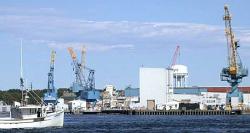
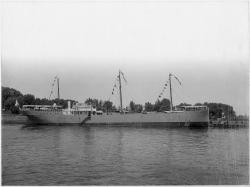
The Zoroaster, commissioned and completed in 1878, is widely considered to be the world's first successful oil tanker. It was designed by Ludvig Nobel, who notably refused to patent any part of it, leading to the design being widely studied and duplicated around the world. The tanker was built in Gothemburg, Sweden and was intended to navigate the Caspian Sea, running between Baku, Azerbaijan and Astrakhan, Russia.
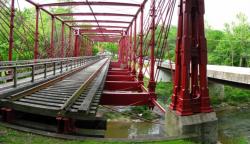
The design of the Bollman Truss Bridge-patented in 1852 and one of the first to use iron exclusively in all essential structural elements-was critical in the rapid expansion of American railroads in the 19th century. Replacing wooden bridges, which were cumbersome to build and vulnerable to decay, the Bollman Truss Bridge could be built relatively quickly and inexpensively, while providing the long-lasting qualities associated with metal. This allowed new rail lines to be built over long distances in a short period of time.
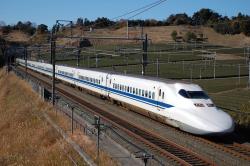
The Tokaido Shinkansen, the world's first inter-city, high-speed railway system, began operations on its route of over 500 kilometers between Tokyo and Osaka more than thirty years ago, in 1964. After its establishment, the Tokaido Shinkansen made a major contribution to Japan's rapid post-war economic growth as the country's principal transportation artery. Today (1997), more than two hundred and eighty Shinkansen trains operate between Tokyo and Osaka each day, with eleven departures an hour at peak times, and a daily ridership of more than 360,000 passengers.
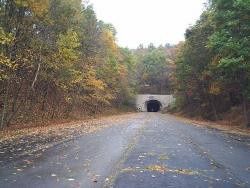
BreezewoodHarrisburgState: PACountry: USAWebsite: http://www.asce.org/project/pennsylvania-tunpike-(old-section)/Creator: Pennsylvania Turnpike Commission
The Pennsylvania Turnpike was the first American paved highway of the automobile era in which tolls alone were expected to pay all project costs. The 160-mile roadway, which cut an east-west path from Pittsburgh to the state capital of Harrisburg, was considered a revolutionary example of transportation system design and served as a model for the Interstate Highway System.
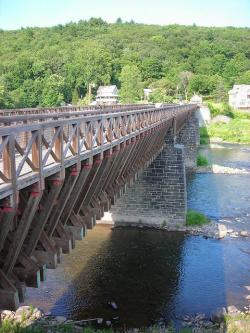
The Delaware Aqueduct provided an important transportation link between the Pennsylvania's coalmines and New York's booming industrial marketplace. It is the earliest surviving work of John A. Roebling, who designed the Brooklyn Bridge 30 years later. The cable anchorage system first used on this project was also used on the Brooklyn Bridge. The aqueduct is patterned after Roebling's design of the Pennsylvania Canal over the Allegheny River, and is the oldest metal strand cable suspension bridge still standing in the U.S.

One of four single-track tunnels built by the Blue Ridge Railroad, the 4,273-foot Crozet Tunnel was constructed at a time when hand drills, pickaxes, and black powder amounted to state-of-the-art tunneling technology. At the time of its completion, it was the longest railroad tunnel in the world. Envisioned and built by Claudius Crozet, a French-born educator and civil engineer, the tunnel remains a testament to his belief in advancing rail transportation even when faced with numerous difficulties.

Cabin John Aqueduct, designed by Montgomery C. Meigs, conveys drinking water from Great Falls, Maryland to Washington, D.C. It was the longest stone masonry arch in the world for nearly 40 years. The segmental arch of the bridge has a span of 220 feet and a rise of only 57 feet. The main arch ring is built of cut and dressed granite. The secondary arch ring is radially-laid sandstone, of which the rest of the bridge is also constructed.
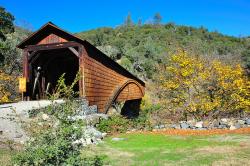
A product of the Northern California Gold Rush, the Bridgeport Covered Bridge is believed to be the longest, single-span, wooden covered bridge in the United States. Crossing the south fork of the Yuba River at a span of 233 feet, the bridge was built by the Virginia City Turnpike Company as part of a 14-mile toll road authorized by the California state legislature. The toll road was an essential link connecting Virginia City, Nevada, and the silver-producing Comstock Lode with the centers of California commerce.
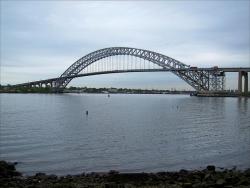
The longest steel-arch bridge in the world for 46 years, the Bayonne Bridge continues to be celebrated today as a major aesthetic and technical achievement. The 1,675-foot bridge replaced a ferry service which until then was the only means of crossing from the Bayonne peninsula to Staten Island. While providing this essential link in the transportation network of greater New York City, the bridge's mid-span clearance of 150 feet also allows for unobstructed navigation on Newark Bay, the main shipping channel to the inland ports of Newark and Elizabeth, New Jersey.
Innovations
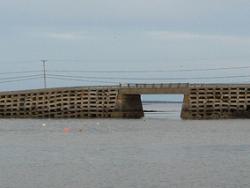
Hardy fishermen and their families have long inhabited Bailey Island, which was settled in the 1720s. Ordinarily, they did not mind crossing to the mainland in their fishing boats. But before the Bailey Island Bridge was built, during certain seasons of the year when violent storms battered the…
Read More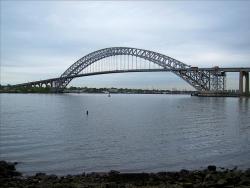
The longest steel-arch bridge in the world for 46 years, the Bayonne Bridge continues to be celebrated today as a major aesthetic and technical achievement. The 1,675-foot bridge replaced a ferry service which until then was the only means of crossing from the Bayonne peninsula to Staten Island…
Read More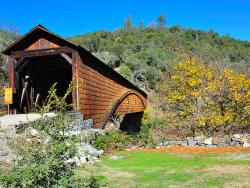
A product of the Northern California Gold Rush, the Bridgeport Covered Bridge is believed to be the longest, single-span, wooden covered bridge in the United States. Crossing the south fork of the Yuba River at a span of 233 feet, the bridge was built by the Virginia City Turnpike Company as…
Read More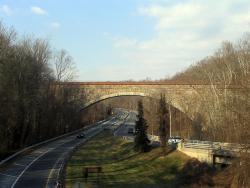
Cabin John Aqueduct, designed by Montgomery C. Meigs, conveys drinking water from Great Falls, Maryland to Washington, D.C. It was the longest stone masonry arch in the world for nearly 40 years. The segmental arch of the bridge has a span of 220 feet and a rise of only 57 feet. The main arch…
Read More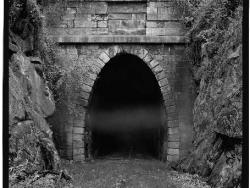
One of four single-track tunnels built by the Blue Ridge Railroad, the 4,273-foot Crozet Tunnel was constructed at a time when hand drills, pickaxes, and black powder amounted to state-of-the-art tunneling technology. At the time of its completion, it was the longest railroad tunnel in the…
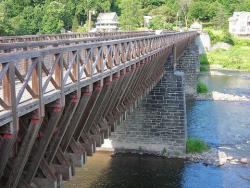
The Delaware Aqueduct provided an important transportation link between the Pennsylvania's coalmines and New York's booming industrial marketplace. It is the earliest surviving work of John A. Roebling, who designed the Brooklyn Bridge 30 years later. The cable anchorage system first used…
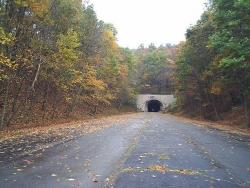
The Pennsylvania Turnpike was the first American paved highway of the automobile era in which tolls alone were expected to pay all project costs. The 160-mile roadway, which cut an east-west path from Pittsburgh to the state capital of Harrisburg, was considered a revolutionary example of…
Read More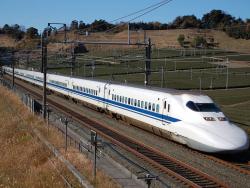
The Tokaido Shinkansen, the world's first inter-city, high-speed railway system, began operations on its route of over 500 kilometers between Tokyo and Osaka more than thirty years ago, in 1964. After its establishment, the Tokaido Shinkansen made a major contribution to Japan's rapid post-war…
Read More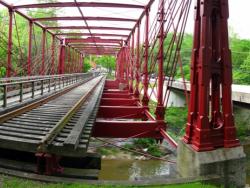
The design of the Bollman Truss Bridge-patented in 1852 and one of the first to use iron exclusively in all essential structural elements-was critical in the rapid expansion of American railroads in the 19th century. Replacing wooden bridges, which were cumbersome to build and vulnerable to…
Read More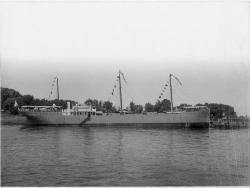
The Zoroaster, commissioned and completed in 1878, is widely considered to be the world's first successful oil tanker. It was designed by Ludvig Nobel, who notably refused to patent any part of it, leading to the design being widely studied and duplicated around the world. The tanker…
Read More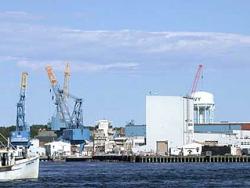
The Portsmouth Navy Yard is a United States Navy shipyard in Kittery on the southern boundary of Maine near the city of Portsmouth, New Hampshire. Founded in 1800, PNS is U.S. Navy's oldest continuously operating shipyard. Today, most of its work concerns the overhaul, repair, and modernization…
Read More

